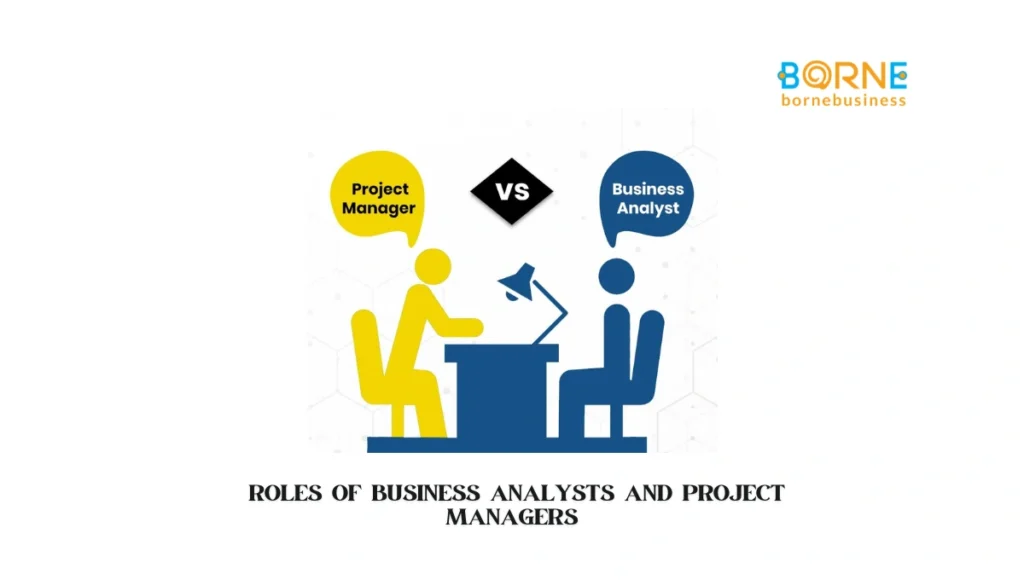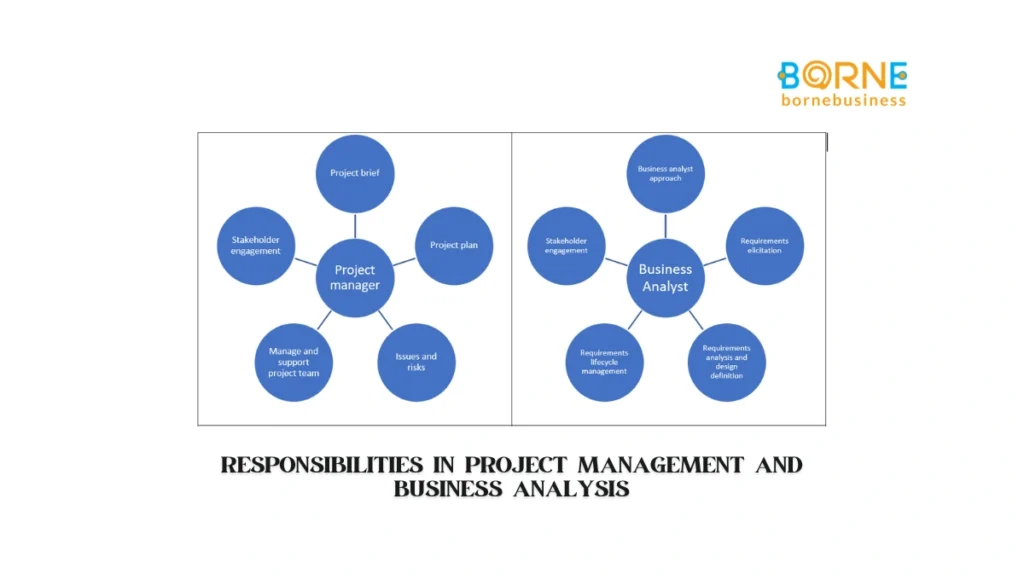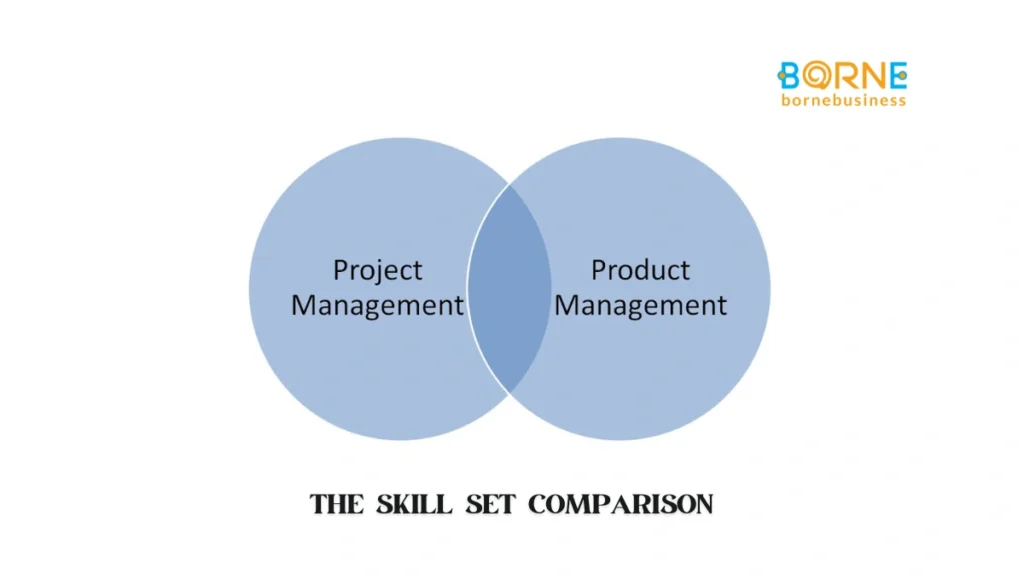Business Analyst vs. Project Manager: What’s the Difference Between These Two Crucial Roles?
Modern work environments demand a certain level of collaboration and velocity, so two key roles that are often tasked with making sure the project stays on track are business analysts and project managers. These roles are separate in purpose and skill set, but their responsibilities can overlap.
For any organization that wants to achieve its business goals, it is necessary to understand what differentiates a business analyst from a project manager and how both of them complement each other.
In this article we will take an in-depth look only into the two roles and how they contribute to project results. If you are looking for a career path between business analyst and project manager or you want to get information about the project manager vs business analyst, this guide will help. Hopefully, after reading this, you will know how to work with and leverage development QA roles to achieve all of our project goals.

Understanding the Roles of Business Analysts and Project Managers
Business Analyst Role — A Brief Summary
The role of a business analyst is that of a problem-solver and strategist — an individual who analyzes the organizational business and formulates solutions that bring high value to it. They are tasked with understanding business issues, finding areas of opportunity and simply making sense of the restless needs of a large organization.
A business analyst works closely with stakeholders to make sure that what the project is trying to achieve also corresponds with the country’s core Business đề goals.
The business analyst is more than a technical hammer. They bridge the business and IT teams to align them towards a common goal. Hands-on Business Analyst:
An IBA that connects business processes and the technology right (i.e recommends changes to the actual workflows and systems so as to reduce inefficiencies) For instance, a business analyst might look at the business processes of a company or an organization and see where things are getting jumbled up and how those dependencies could be solved through implementing software solutions which would help in automating this manual effort.
In addition, business analysis work methodologies are commonly used by business analysts in order to eliminate ambiguity and uncertainties around requirements.
Working with stakeholders to clarify vague goals, build business cases, and deliver insights your audience can act on Their problem-solving ability for real business problems makes them priceless in delivering impactful solutions.
Project Manager Role and Responsibilities
Conversely, a project manager is the person who drives the project from start to finish. Detailed project plans are crafted, project scope is defined, and to-do lists made with bullet points made to make sure all objectives get done on time and on budget. They are execution-oriented leaders who ensure that the project is executed seamlessly.
Being a project manager means coordination and leading roles. They provide resources, manage risk, and supervise team members to deliver on project outputs. A project manager heads off any situation that threatens the progress of a project, be it preparing a project charter or heading off unanticipated issues.
One of their key responsibilities is communication between the stakeholders and all team members so that everyone is on the same page. When it comes to the success of a project, the project manager is responsible for everything — from monitoring timelines to ensuring that quality standards are met.
Differences Between a Business Analyst And A Project Manager
The Business Analyst is more focused on finding answers to business needs whereas the Project Manager is more execution and delivery-oriented with a focus on defining project constraints, planning schedules, and implementing control mechanisms that will measure other core management components.
Business analysts investigate the business domain in search of solutions to organizational problems and opportunities for improvement.
In project-based environments, the goal of any project manager is to deliver projects on time and within scope by managing resources and mitigating risks en route to obtaining end results.
While there is some overlap in what they do, both bring something different to a successful project. This collaboration is often what makes or breaks the efficiency in which business objectives are met.

Roles and Responsibilities in Project Management and Business Analysis
How Business Analysts Bridge the Gap Between Stakeholders and Teams
The role of business analysts is to bridge the gap between stakeholders and project team members, gaining clarity on business needs so that everyone has a common understanding. They may conduct data analysis and workshops to document what they have discovered in a manner that fits in with the organization.
The Role of the Project Manager: Scheduling and Overseeing All Aspects of the Project
The pm role will have a minimum teamore to lead and ensure each piece of the project aligns with the project charter. For instance, a senior project manager would be managing many teams and will make sure that every phase of the project fits into the larger organizational strategy.
The More Your Role Overlaps With Others: When Your Responsibility Is Not Unique
Yet, in certain cases like agile projects, the roles are merged. Constructively, a project manager and business analyst might work together to mitigate risks, track delivery, and ensure successful projects.

Business Analyst vs. Project Manager: The Skill Set Comparison
Key Skills Required for Business Analyst
Balancing Critical Thinking with Interpersonal Skills If you want to be a successful business analyst, you will need to utilize as many different skills as possible, but this is all rooted in a specific skill set. Key skills include:
Advanced thinking skills and problem-solving business analysts are very good at identifying inefficiency and assessing the system and the business processes to create a viable solution.
Skilled in business analysis tasks: They know how to connect the dots between tech and stakeholders by translating business needs into requirements.
Communication: Good communication → allows you to gather requirements, manage expectations, and ensure all hands-on decks are on the same page about goals.
Business domain awareness — a detailed knowledge of the vertical gives them the ability to make meaningful and impactful recommendations.
Top Skills About a Project Manager
Managing projects, as a project manager you need a broader and execution-oriented skill set to manage the project from end to end. Must-Have Skills:
Leaders and decision-makers: The project manager guides the teams, directs conflict resolutions, and starts tactical decision-making so that projects are managed in the right direction.
Expertise in risk management: Significant for keeping up with deadlines and accomplishing milestones by spotting potential roadblocks and handling risks.
Allocation of resources: the management of distribution in order to ensure the timely completion of projects and on budget.
Project management methodologies: Proficiency in frameworks like Agile, Waterfall, or hybrid models allows them to adjust according to unique project requirements.
Are these positions related to certifications?
Both roles see an increase in their overall credibility and career prospects when they have certifications.
Alternatively, business analysts can seek certifications like the Certified Business Analysis Professional (CBAP) from the International Institute of Business Analysis (IIBA), which proves professional practice experience.
Many project managers obtain the Project Management Professional (PMP) certification from the Project Management Institute (PMI), which demonstrates their ability to manage complicated assignments.
These certifications are not compulsory all the time, however, they reflect lifelong learning and are widely regarded in competitive job markets.
Career Options: As a Business Analyst or Project Manager
How to Become a Business Analyst
Beginning a Business Analyst Career path requires you to acquire skills of Technical, Analytical as well as Interpersonal nature. Here’s how to get started:
Get proficiency in business analysis tools and techniques: Understand the types of instruments frequently used in the area such as Microsoft Visio, Lucidchart, or Tableau, and recognize robust frameworks like Agile or Waterfall for transforming pandemic procedures into more optimized shapes.
Earning Business Analysis Certifications: Business Analysis Certification such as Certified Business Analysis Professional (CBAP) or any certifications from the International Institute of Business Analysis( IIBBA) also add value to your marketability and show proof of your proficiency.
Gain experience in the analysis of business needs: Start at companies where you can discover and address Wrongs that Cause Business Problems. It is through this experience that you will learn to build solutions with the business in mind.
How to Become a Project Manager: A Step-by-Step Guide
Project management is a career path that emphasizes leadership and organization. Here are the key steps:
Establish a solid understanding of core project management principles: Familiarise yourself with concepts such as scope, timeline, and budget management. The ability to lead teams also means being aware of methodologies such as Agile, Scrum, or Kanban.
Get a project management certification: Certifications such as Project Management Professional (PMP) provided by Project Management Institute (PMI) are well-respected and can make you more noticeable amidst this competitive job market.
Develop a history of running successful projects: Begin your career with small projects to gain experience in planning, execution, and managing stakeholders. Writing this will help you to take up more complex initiatives sooner.
Which Role Is Right for You?
It all comes down to your personal interests and skill set when deciding between the two roles:
Select a career as a business analyst if you love doing the work of business analysts, identifying inefficiencies, and putting on your problem-solving hat to provide solutions for business problems.
If you enjoy leading teams and coordinating people and resources to provide successful projects, then choose the project management route.
Both career paths are gratifying and significant to the success of an organization.

Agile Approach: Blending Both Roles in a Modern Workplace
Agile Projects and the Role of Business Analysts
Business Analysts play the most significant role in Agile because they make sure that requirements evolve with respect to the nature of an iterative project. Instead of specifying all the requirements beforehand, Business analysts collaborate with the stakeholders and product owner during the project life-cycle.
They groom the backlog, assess changed business requirements, and aid in identifying priorities to achieve the changing objectives of the project. This continuous collaboration resolves business issues in an efficient manner and elevates the relevance and significance of a solution.
Agile Frameworks Project Managers
The Agile PM is more a facilitator than a Primary Lead. Their emphasis lies on building a collaborative environment; they do this by eliminating bottlenecks, setting up communication channels among the team members easily, and keeping a check that each sprint aim is consistent with the complete project plan. They keep the project on track, tracking progress, controlling risks, and adapting to changes while working towards its business objectives.
Combining Roles for Project Success
In some modern workplaces, organizations combine both roles to enhance communication and team efficiency. The hybrid role combines the analytical focus of a business analyst with the implementation-oriented mindset of a project manager. Combining this skill set results in teams that gain one person to connect business analysis and project management; the business interests and technical execution are fully aligned.
This process works well, especially for small teams and Agile projects, where the flexibility of this process can make or break a project.

Common Challenges and Solutions in These Roles
Experiences in managing stakeholder expectations
Both project managers and business analysts face the same issue which is managing conflicting stakeholder priorities. The variation of opinions on the direction, purpose, or urgency of a project from stakeholders can result in misaligned expectations.
SOLUTIONS: Both types of relationships are built over time, and regular communication is important to build such trust. Defining a stakeholder engagement plan can help alleviate concerns even before they arise. By conducting workshops or one-on-one meetings to explain the business requirements and project goals, we create a common understanding. Using visuals, such as roadmaps or dashboards can make transparency easier to provide and set achievable goals.
Solving Business Problems the Right Way
For business analysts, the key challenge is finding economical ways to solve one or more business problems. However, they also must be unique and inventive about it. These issues may arise from non-optimized business processes, ambiguous requirements, or misaligned strategies.
SOLUTIONS: You need to have excellent business analysis skills. Tools like root cause analysis, SWOT analysis, and process mapping help a business analyst figure out the actual problems and provide steps to solve them. Stakeholder feedback loop to validate these solutions and solve the problem
To Communicate and Collaborate Effectively
If there is any miscommunication between the project manager and business analyst, it may break the flow of the project which else in turn will affect overall output. Siloed capacity to deliver can result in missing requirements or misaligned priorities and may adversely impact the delivery of the complete project.
SOLUTIONS: Defining the interaction between both roles at the beginning of a project alleviates any potential confusion. Planning sessions together, and updates in sync produce the atmosphere of a lab.
Use of Tools: Gantt charts, Kanban boards, or documentation tools that can be shared help in the front-facing nature for visibility for all parties involved. Effective collaboration puts synergy between both, increasing the efficiency level and simplifying the project’s success.
Summary of Key Points
Business analysts focus on business requirements and defining solutions for them, whereas project managers work with the various stakeholders involved in getting a project delivered as efficiently as possible.
In addition, both professions involve good analytical, communication, and leadership skills.
These registration documents like PMP or CBAP will help you in pursuing your career more.
This Bang for the Buck in Agile also means that there will be instances where you combine these roles and that is where we see a better fruit yielded during project delivery.
Collaboration between the two roles is critical for meeting business outcomes and providing value.
In short, knowing the differences between business analyst and project manager roles and understanding how they complement each other are important aspects of a successful career in these fields. Good projects can be done at the right career path and all you need to do is make a proper selection of your career. Then, you will solve real business problems that help drive success.


[…] Small business management simply means managing a small business. That includes looking after money management such as having a healthy cash flow and tracking expenses and revenue. In addition, small business managers must also focus on other matters such as hiring and training staff, ensuring customer satisfaction is high, and marketing their business to bring in new business while retaining existing clients. […]